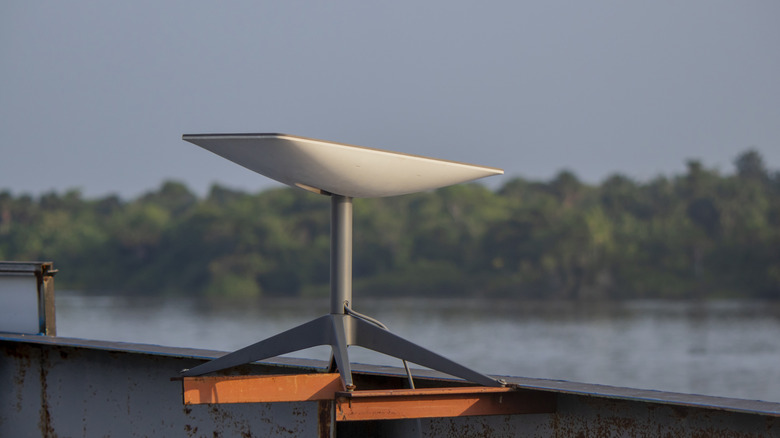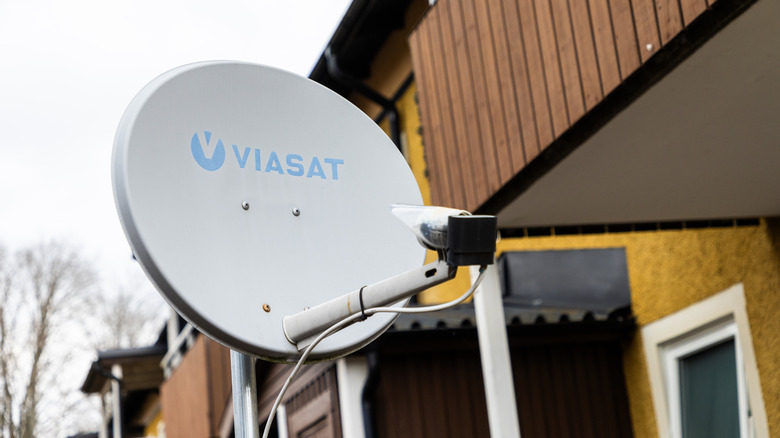Starlink Vs. Viasat: Is There A Starlink Alternative Worth Using?
Those who live in rural areas often have limited internet options, so they depend on a reliable satellite dish to provide them with Wi-Fi. Those who travel like digital nomads or vanlifers depend on a portable satellite internet to take with them on the go so that they can still work. Both Starlink and Viasat are providers that are available across the country and offer service around the world, making both of them interesting options to compare.
Starlink is owned by SpaceX, an Elon Musk company, while Viasat is owned by its shareholders. Both Starlink and Viasat offer residential internet and on-the-go internet options. Both of them need to be plugged into a power source to work and both of them have unlimited data available for their residential plans. But that is where their similarities end.
Viasat boasts that it offers professional installation, something that Starlink does not. Starlink does, however, allow third-party installers in select locations. Those who are interested in the innovative new technology SpaceX is coming out with will be drawn to Starlink, especially the Starlink Mini, which is great for travelers. However, Starlink is also likely to drive away those who don't like the controversial figure of Elon Musk, and turn them into Viasat customers instead. In addition, both Starlink and Viasat differ in their affordability, the speeds they offer, and their overall transparency when it comes to price and resolving customer complaints.
Comparing Starlink and Viasat costs
The Starlink Residential Lite plan is $80 a month. For that, you get unlimited data, but you are not given priority, so you will have slower speeds than those on the $120 a month Residential plan. Viasat has an Essentials plan that gives you 150 GB of high-speed data, plus unlimited standard data, for $69.99 a month. Viasat also has an Unleashed plan with unlimited high-speed data for $99.99 a month. Both Viasat plans are cheaper than Starlink's comparable plans.
Starlink has a Roam plan for its Starlink Mini, which is meant to be taken on your adventures. The basic Roam plan offers 50 GB of data for $50 a month. Its Roam Unlimited plan offers unlimited data for a staggering $165 a month. Viasat also offers portable internet options referred to Viasat Go-anywhere. It has three plans: the Flex, the Pro, and the VSAT. All of them require a contract, which can range from a week to over a year. However, Viasat does not show its Go-anywhere prices on its website. You are forced to call the company to negotiate a price.
When comparing the cost, Viasat is cheaper for residential, which may make it more appealing for home users. However, the lack of transparency for its Go-anywhere cost is a serious blow to consumer trust and price accountability. There's no clear guideline for what you might be charged and why. Because of that, Starlink is the preferred option if you need to be mobile.
Comparing Starlink and Viasat reputation and service
The Better Business Bureau (BBB) shows that neither Viasat nor SpaceX is accredited. That means neither company has passed its Standards of Trust for transparency, honest advertising, data safety, and customer care. Viasat has an A+ score on the BBB due to its complaint responsiveness. However, SpaceX has a score of F. Note that Starlink is part of SpaceX, but the score reflects the company as a whole and not just the satellite internet. The BBB gives the reason for the F score as being that the company fails to respond to complaints, fails to resolve complaints, and takes too long to respond in general. This isn't the first time Starlink has alienated its customers due to its business practices.
When it comes to internet performance, Starlink offers faster download speeds. It provides up to 270 Mbps depending on the plan, while Viasat offers up to 150 Mbps. Though generally, across all plans, Starlink is faster. Speed is critical when you travel and need to work on the go. It's also important for residential needs, such as streaming videos and playing video games.
Overall, Viasat is a viable alternative to Starlink. As of now, Starlink customers seem to be happy to pay more for their higher speeds. And, because Starlink is so new (Viasat was started in 1986), time will ultimately tell if it ends up winning over more Viasat customers.


